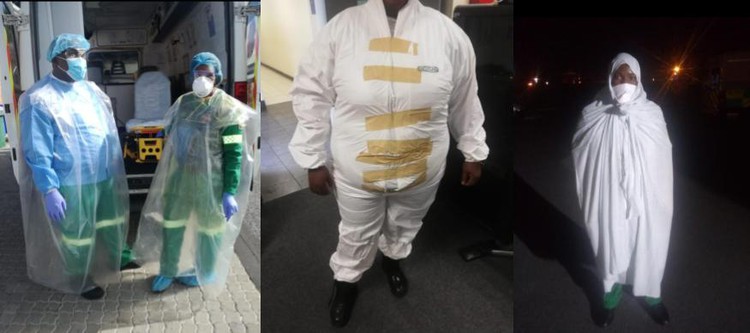Covid-19: Emergency workers resort to making their own protective equipment
But Western Cape Health says workers do have sufficient equipment
Emergency Medical Service (EMS) workers in Khayelitsha resorted to using plastic sheets, duct tape and bed covers to protect themselves while transporting patients at the weekend.
When stocks of the right size suits ran out, one worker whose suit did not fit her had to close it with duct tape. EMS workers are demanding full protective suits to work in.
But Western Cape Health says workers have been given sufficient personal protective equipment.
As of 1pm on 5 May, the Western Cape had recorded 2,610 confirmed active cases of Covid-19. Of these, 474 cases were recorded in Khayelitsha alone.
On Saturday, about 30 EMS workers based in Khayelitsha went on strike, demanding that they be given adequate personal protective equipment (PPE). The group resumed work on Monday after meeting with management to discuss their concerns.
“After every shift, I take off everything and spray myself. As soon as I get home, I shower and scrub myself before I touch my children because I’m so scared of giving them the virus,” says EMS worker Charlotte Clarke, who was one of the strikers.
She is an intermediate life support practitioner at Eastern Division, which services thousands of residents in Khayelitsha, Strand, Macassar, Somerset West, Gordons Bay and Sir Lowry’s Pass.
“Right now we use the face visor, mask, gloves and an apron. This is not enough. We need the A40 suit that gives full protection to do hospital transfers as well as suspected and confirmed Covid-19 cases. But we were told by management that we can’t use the A40 for home calls and suspected cases, that it’s only for confirmed cases,” said Clarke.
Before the Covid-19 pandemic, EMS workers used the A40 suits only when transporting drug-resistant TB patients and there were enough to go round. “Then Covid-19 hit and we started wearing the suits more often. When we got a call, we would go to the base to put on the A40 suit, and go fetch the patient. This worked for a month then they realised the stock was running out.”
Clarke says last month she responded to a house call and, without a suit, says she was possibly exposed to the coronavirus.
“My ambulance was dispatched to a call that came through as a 20-year-old male patient. When we arrived at the house, it was a 13-month-old baby coughing with a temperature of above 38. I tried to explain to the mother how to take the child’s temperature. Eventually I took the child and did it myself because I could see he was struggling to breathe. I was wearing an apron, gloves, a mask and the visor, but our uniform is short-sleeved so my arms were exposed.”
“I watched as the child coughed and the sputum was all on my naked arm. I washed and sanitised my arm after the call and prayed to God that the child didn’t have Covid-19,” she says.
Clarke says her fear is that she is already infected and could possibly be infecting not just her family but the patients she assists daily.
“We are only getting screened now but not tested. I have been exposed so many times, I don’t know if I’m positive and just asymptomatic. I took it upon myself to get my own A40 suit,” she says.
“We need those suits. We just want to be safe. We want to prevent the spread. We are not asking for a lot.”
Nomveliso Matiwane, a shop steward at the National Union of Public Service and Allied Workers shop steward, said paramedics did not feel safe with only masks, aprons and gloves. “Our protective gear is not adequate. The A40 suit covers the whole body.”.
But Deanna Bessick, spokesperson for Western Cape Health Department, told GroundUp that EMS staff’s PPE guidelines were based on the medical evidence.
Commenting on the strike by workers over the weekend, she said: “They refused to work unless the department adhered to their perceived ‘PPE’ demands. We had no option but to send the staff home for refusing to work.”
Bessick said: “The guidelines have been developed and published for all Western Cape health care workers and the department has also issued an EMS specific circular to offer additional direction to staff … The ambulances are disinfected after each call. Once the vehicle has been cleaned it is aired.”
Support independent journalism
Donate using Payfast

Don't miss out on the latest news
We respect your privacy, and promise we won't spam you.
Next: Covid-19: Teachers alarmed over schools reopening
Previous: Covid-19: Slain Alex man’s case highlights failures of police and army watchdogs
© 2020 GroundUp.
This article is licensed under a Creative Commons Attribution-NoDerivatives 4.0 International License.
You may republish this article, so long as you credit the authors and GroundUp, and do not change the text. Please include a link back to the original article.

